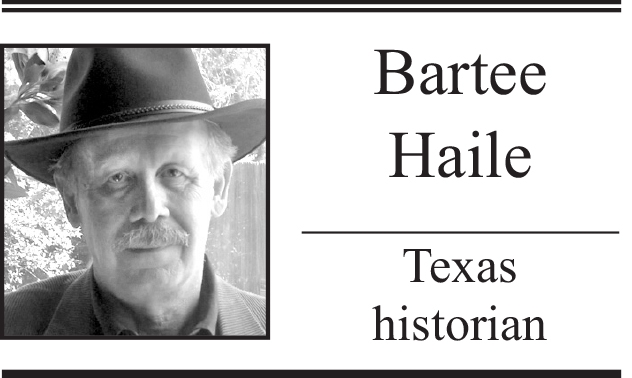Lynchings ignite Hoodoo War

by Bartee Haile
A masked mob dragged five suspected cattle thieves kicking and screaming from the Mason County jail on Feb. 18, 1875, lynched three of the terrified outlaws and touched off a nasty feud forever known as the Hoodoo War.
In the chaotic aftermath of the Civil War, Texans often took the law into their own hands. Desperate characters, who mistook common folk for easy pickings, were routinely dispatched without benefit of judge, jury or clergy.
Like so many similar episodes, the Mason County hanging might soon have been forgotten had the vigilantes not been Germans and the victims so-called “natives.” Blood began to flow when fear replaced reason, and people blindly picked sides along ethnic lines. Small ranchers and farmers of German descent hesitated to strike back against the saddle tramps plundering their precious few possessions in the early 1870’s. Having suffered for their pro-Union opinions during the war, they wanted only to pick up the pieces of their quiet lives. The last thing most German Texans wanted was trouble.
Confronted by a worsening crime wave, Mason County voters elected a new sheriff, who promised a complete cleanup. John Clark did his best, but the rustler rings were always one step ahead of the inexperienced lawman.
In February 1875, the sheriff got lucky. He caught five members of the notorious Backus Gang red-handed with a herd of stolen cattle. That evening a crowd of irate citizens overcame light resistance at the local lockup and whisked the prisoners off to the nearest tree.
A Texas Ranger, who just happened to be passing through, crashed the necktie party in time to save a pair of the badmen. Sheriff Clark suddenly appeared to back his play but swore he could not identify any members of the mob that disappeared in the darkness.
Word of the lynching spread like wildfire. Although the “native” ranchers could have cared less about the Backus bunch, they feared indiscriminate attack from an aroused German community. In a show of force, they occupied the county seat.
At the head of 60 armed Germans, Sheriff Clark retook the town and negotiated a fragile truce. Six weeks later, the cold-blooded killing of a popular “native” rancher shattered the peace. Lured off his property by a deputy sheriff, Tim Williamson was brutally bushwhacked.
The senseless slaying brought into the simmering feud Scott Cooley, the victim’s half-crazed adopted son. Since Indians slaughtered his parents and held him captive as a child, Cooley had never been quite right in the head. The murder of the stepfather he idolized pushed the grief-stricken youth over the edge.
Coming upon the guilty deputy digging a well, Cooley shot him six times, repeatedly stabbed his dead body and removed his scalp. To prove his gruesome point, he made the rounds of the Mason saloons proudly displaying the grisly trophy in each and every establishment.
Both sides suffered casualties in the ensuing county-wide conflict. Cooley organized his own band of trigger-happy misfits, who had no stake in the affair but relished the combat. Mason County quickly became a blood-soaked battleground.
After weeks of strife, a Ranger company commanded by Major John B. Jones temporarily restored order. Sheriff Clark complied by immediately resigning and vanishing without a trace.
Cooley, however, calmly stayed put. The former Ranger bet his old comrades would be reluctant to bring him in, and to the disgust of Major Jones, he was right.
Six weeks later, the Rangers pulled out of the war-torn county leaving a token force to keep up the half-hearted hunt for Cooley. Meanwhile, the fugitive shrewdly steered clear of Mason but continued his search for German targets.
In late 1875, Cooley and sidekick Johnny Ringo, the same gunslinger who later blazed his way into the history books in Arizona, were arrested in Burnet. Hopes for an end to the bloodshed soared in Mason County only to be dashed by news of a suspicious jailbreak.
Freed by friends in Lampasas County, Cooley resumed his rampage. But revenge did not put food on the table, and to satisfy his grumbling followers as well as his own stomach, he turned to the tried-and-true practice of rustling cattle. In a few months, Cooley was teaching old hands a thing or two about swiping steers.
Deliverance sometimes comes in strange packages, and for Mason County it came in a bottle. Cooley stopped for dinner at Fredericksburg and bought a fifth of whiskey for the road. Several swigs later, he tumbled from the saddle and lapsed into a coma.
By dawn Scott Cooley was a goner, done in not by a dose of lead but poison. With him died the Hoodoo War, and the barricades at last came down in battle-scarred Mason County.
Bartee’s three books “Texas Depression-Era Desperadoes,” “Murder Most Texan” and “Texas Boomtowns: A History of Blood and Oil” are available for purchase at barteehaile.com.

